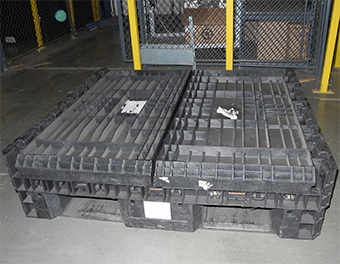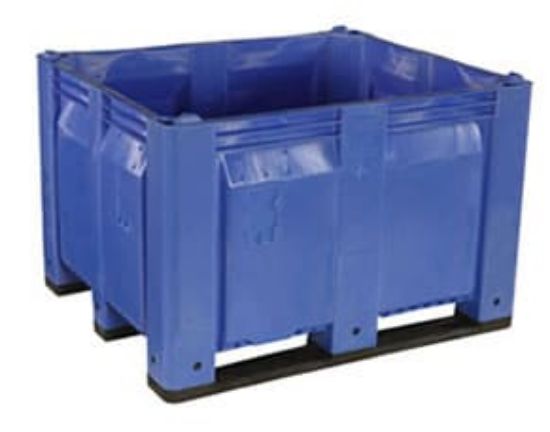Why Mass Containers Are Necessary for Affordable and lasting Transport
Mass containers play an essential role in contemporary logistics. They facilitate the efficient movement of big quantities of goods, thereby maximizing transportation procedures. This technique not only lowers costs yet likewise decreases ecological influence through reduced emissions and waste generation. As sectors seek more lasting techniques, the adoption of bulk containers is becoming significantly considerable. What ramifications does this change hold for future logistics and supply chain administration?

The Benefits of Using Bulk Containers in Logistics
Mass containers change logistics by boosting effectiveness and sustainability. These containers enable the transportation of huge quantities of goods in a single trip, significantly decreasing the number of journeys required. This not only enhances operations but likewise decreases labor prices linked with handling, filling, and dumping. Furthermore, bulk containers are developed to enhance room application within transport vehicles, making sure that more products can be delivered at the same time.
The standardization of mass containers also simplifies the logistics process. With consistent measurements, they can be quickly piled and kept, bring about improved warehouse administration. In addition, bulk containers often include long lasting products that secure materials from damage during transit, therefore decreasing item loss and boosting general integrity. Consequently, companies can experience improved supply chain efficiency, eventually resulting in increased productivity and consumer fulfillment. This combination of elements makes mass containers a critical property in modern logistics.
Environmental Influence: Decreasing Waste and Carbon Footprint
As sectors significantly prioritize sustainability, the adoption of mass containers has become a crucial method for minimizing waste and lowering carbon impacts. These containers lessen the use of packaging materials, such as boxes and plastic, consequently especially lowering general waste generation. By consolidating shipments, bulk containers improve transportation performance, enabling even more items to be carried per journey. This reduction in journeys straight associates with reduced greenhouse gas discharges, adding to a smaller carbon footprint.
Mass containers can typically be reused or reused, additionally reducing environmental influence. The durability of these containers warranties they can stand up to several transportation cycles, minimizing the demand for single-use alternatives. used collapsible containers. By streamlining logistics and advertising effective source usage, mass containers not only support lasting methods however additionally motivate industries to line up with global ecological objectives. Eventually, their implementation shows a dedication to environmental stewardship and liable source administration
Cost Savings: Just How Mass Containers Lower Transport Expenses
While many companies seek means to improve their profits, using mass containers provides a considerable opportunity for decreasing transportation expenses. Bulk containers make the most of the quantity of items delivered, allowing services to ship larger quantities simultaneously. This effectiveness minimizes the number of journeys required, directly lowering fuel expenses and reducing labor costs connected with loading and unloading.
In addition, mass containers typically include streamlined layouts that enhance room application within transportation lorries. This indicates fewer voids, causing more efficient use of offered capability. Furthermore, the toughness of bulk containers can reduce the risk of item damage during transit, making sure and lowering losses that even more goods get here undamaged.
Enhancing Supply Chain Performance With Mass Storage Solutions
Bulk storage space remedies play a necessary duty in improving supply chain performance by maximizing supply administration. By settling goods right into less, bigger containers, businesses can substantially lower taking care of expenses connected with constant transfers and processing. This streamlined approach permits better monitoring and monitoring of supply, ultimately leading to boosted operational efficiency.
Structured Inventory Management
Reliable inventory management is important for enhancing supply chain procedures, particularly when organizations adopt bulk storage options. These remedies make it possible for organizations to maintain higher supply degrees while decreasing the frequency of replenishment. By consolidating products right into mass containers, business can simplify their supply procedures, decreasing the intricacy associated with tracking several smaller bundles. This technique facilitates exact supply counts and improves forecasting precision, permitting more educated decision-making. On top of that, mass storage options streamline storehouse organization, making it simpler to situate and gain access to products when needed. Consequently, organizations can attain a much more reliable inventory turnover price, ultimately improving overall supply chain efficiency and lowering the chance of stockouts or overstock situations.

Decreased Handling Costs
The application of mass storage space remedies not only streamlines inventory administration yet likewise significantly reduces managing costs throughout the supply chain. By settling products into mass containers, business minimize the requirement for frequent handling and transfer between different storage and transport devices. This method reduces labor costs related to loading, dumping, and relocating smaller plans. In addition, mass storage space minimizes the regularity of deliveries, resulting in reduced transport costs and decreased fuel usage. As a result, services can enhance their logistics procedures, enabling for an extra effective allocation of resources. Eventually, lowered dealing with expenses contribute to improved total supply chain efficiency, promoting a setting that supports both sustainability and financial practicality.

Flexibility of Mass Containers Across Various Industries
Although several sectors have distinctive demands for transport and storage space, mass containers have emerged as a functional service that meets a broad variety of requirements. These containers, ranging from large bins to specialized tanks, can fit varied materials, including liquids, powders, and granules. In the agricultural industry, bulk containers assist in the transportation of grains and plant foods, while the food and beverage market uses them for ingredients and finished items. The chemical industry depends on bulk containers for securely transferring unsafe products, guaranteeing conformity with security laws. Additionally, building and construction firms take advantage of mass containers for carrying aggregates and various other products. Their adaptability includes different modes of transport, including trains, vehicles, and ships, enhancing logistical performance. This versatility not only improves procedures throughout various sectors however additionally advertises sustainability by minimizing product packaging waste and enhancing room in transportation. Mass containers play an essential role in contemporary supply chain management.
Future Trends wholesale Container Usage and Sustainability
The future of bulk container use is progressively formed by innovative materials advancement that boosts sustainability. In addition, automation in logistics assures to simplify operations, reducing waste and improving performance. Welcoming circular economy techniques will certainly better transform how bulk containers are made, utilized, and reused, cultivating a much more lasting transportation landscape.
Ingenious Products Development
As industries significantly prioritize sustainability, innovative materials development wholesale containers becomes a considerable variable in improving eco-friendly transport solutions. Scientists and suppliers are discovering naturally degradable plastics, recycled composites, and light-weight steels to decrease ecological impact. These products not only minimize waste however also enhance fuel efficiency by reducing the total weight of containers. In addition, improvements in wise materials, which can adapt to varying conditions, improve the durability and performance of bulk containers. The integration of these innovative products straightens with circular economy concepts, promoting reuse and recycling. As the demand for lasting methods expands, the advancement of such materials will play a crucial duty fit the future of bulk container usage in logistics and transport.
Automation in Logistics
Considerable advancements in automation are get more info poised to transform logistics and the utilization of mass containers, improving sustainability in transport. Automated systems, consisting of drones and autonomous automobiles, are simplifying the movement of bulk containers, lowering the reliance on standard fuel-powered transportation. These technologies optimize routing and loading procedures, decreasing vacant miles and improving fuel effectiveness. Furthermore, automated inventory management systems enhance monitoring and monitoring of bulk containers, making sure better source allocation and decreased waste. The combination of the Web of Points (IoT) permits real-time data analysis, enabling positive decision-making that aligns with sustainability objectives. As automation remains to evolve, it is expected to drive additionally advancements in mass container use, ultimately supporting more lasting logistics techniques and minimizing the ecological influence of transport.
Circular Economic Situation Practices
Innovations in automation are setting the phase for a much more integrated technique to round economy methods in the domain of mass container use. As sectors increasingly embrace sustainability, mass containers are being created for longevity and reusability. This change not just decreases waste however additionally enhances source performance. Firms are taking on techniques such as closed-loop systems, where made use of containers are accumulated, reconditioned, and reestablished right into the supply chain. Furthermore, smart technologies track container life process, promoting far better administration and reducing ecological impact. The cooperation in between makers, logistics suppliers, and end-users is necessary in developing standards for lasting container use. refurbished bulk containers. Future fads show an expanding emphasis on products that are naturally degradable and recyclable, further enhancing the round economic climate's concepts in mass transportation

Frequently Asked Inquiries
What Products Are Bulk Containers Generally Made From?
Mass containers are usually created from sturdy materials such as high-density polyethylene, steel, light weight aluminum, and cardboard. These products offer strength, defense, and flexibility, making them appropriate for carrying various goods in different markets successfully.
How Do I Pick the Right Dimension Mass Container?
Choosing the appropriate dimension mass container entails examining the quantity of materials to be delivered, thinking about handling devices compatibility, and appraising storage room needs. Proper dimension guarantees efficiency in transportation and decreases waste throughout shipment.
Are Bulk Containers Reusable or Recyclable?
Bulk containers are usually recyclable, developed for numerous trips, improving sustainability. Many can additionally be reused, depending upon the materials made use of. Picking recyclable choices even more decreases and sustains ecological objectives waste in transportation practices.
What Safety Laws Apply to Mass Container Transport?
Security guidelines for mass container transport consist of conformity with the Department of Transportation guidelines, correct labeling of unsafe materials, architectural stability assessments, and adherence to weight limits to guarantee risk-free handling and protect against accidents throughout transportation.
Just How Can Businesses Shift to Utilizing Bulk Containers Efficiently?
Services can transform to bulk containers by evaluating current logistics, educating personnel on handling, purchasing suitable devices, enhancing inventory administration, and collaborating with suppliers to ensure compatibility and efficiency throughout the supply chain.
As markets significantly prioritize sustainability, the fostering of mass containers has emerged as an essential method for lowering waste and decreasing carbon footprints. By combining materials into bulk containers, firms can enhance their supply processes, reducing the intricacy associated with tracking several smaller sized plans. As industries increasingly prioritize sustainability, cutting-edge products development in mass containers emerges as a considerable aspect in improving eco-friendly transport services. Automated systems, including drones and independent automobiles, are simplifying the motion of mass containers, lowering the dependence on traditional fuel-powered transportation. Furthermore, automated stock management systems improve tracking and monitoring of bulk containers, making certain better source allowance and minimized waste.